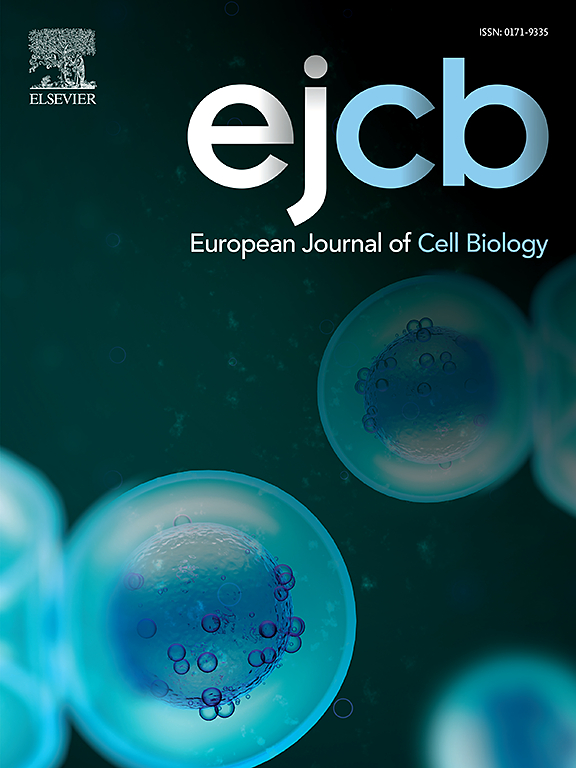Paving the way to a neural fate – RNA signatures in naive and trans-differentiating mesenchymal stem cells
IF 4.3
3区 生物学
Q2 CELL BIOLOGY
引用次数: 0
Abstract
Mesenchymal Stem Cells (MSCs) derived from the embryonic mesoderm persist as a viable source of multipotent cells in adults and have a crucial role in tissue repair. One of the most promising aspects of MSCs is their ability to trans-differentiate into cell types outside of the mesodermal lineage, such as neurons. This characteristic positions MSCs as potential therapeutic tools for neurological disorders. However, the definition of a clear MSC signature is an ongoing topic of debate. Likewise, there is still a significant knowledge gap about functional alterations of MSCs during their transition to a neural fate. In this study, our focus is on the dynamic expression of RNA in MSCs as they undergo trans-differentiation compared to undifferentiated MSCs. To track and correlate changes in cellular signaling, we conducted high-throughput RNA expression profiling during the early time-course of human MSC neurogenic trans-differentiation. The expression of synapse maturation markers, including NLGN2 and NPTX1, increased during the first 24 h. The expression of neuron differentiation markers, such as GAP43 strongly increased during 48 h of trans-differentiation. Neural stem cell marker NES and neuron differentiation marker, including TUBB3 and ENO1, were highly expressed in mesenchymal stem cells and remained so during trans-differentiation. Pathways analyses revealed early changes in MSCs signaling that can be linked to the acquisition of neuronal features. Furthermore, we identified microRNAs (miRNAs) as potential drivers of the cellular trans-differentiation process. We also determined potential risk factors related to the neural trans-differentiation process. These factors include the persistence of stemness features and the expression of factors involved in neurofunctional abnormalities and tumorigenic processes. In conclusion, our findings contribute valuable insights into the intricate landscape of MSCs during neural trans-differentiation. These insights can pave the way for the development of safer treatments of neurological disorders.
为神经命运铺平道路--原始间充质干细胞和经分化间充质干细胞的 RNA 特征
来源于胚胎中胚层的间充质干细胞(MSCs)是成人多能细胞的一个可行来源,在组织修复中起着至关重要的作用。间充质干细胞最有前途的方面之一是它们能够向中胚层以外的细胞类型(如神经元)进行转分化。这一特性使间叶干细胞成为治疗神经系统疾病的潜在工具。然而,如何定义明确的间充质干细胞特征仍是一个争论不休的话题。同样,关于间充质干细胞在向神经命运转变过程中的功能改变,目前仍存在很大的知识空白。在这项研究中,我们的重点是间充质干细胞与未分化间充质干细胞相比,在发生转分化过程中RNA的动态表达。为了跟踪和关联细胞信号的变化,我们在人间叶干细胞神经源性转分化的早期时间过程中进行了高通量 RNA 表达谱分析。在最初的 24 小时内,突触成熟标志物(包括 NLGN2 和 NPTX1)的表达增加。神经元分化标志物(如 GAP43)的表达在转分化的 48 小时内强烈增加。神经干细胞标志物NES和神经元分化标志物(包括TUBB3和ENO1)在间充质干细胞中高度表达,并在转分化过程中保持不变。通路分析揭示了间充质干细胞信号传导的早期变化,这些变化可能与神经元特征的获得有关。此外,我们还发现微RNA(miRNA)是细胞跨分化过程的潜在驱动因素。我们还确定了与神经跨分化过程相关的潜在风险因素。这些因素包括干性特征的持续存在以及涉及神经功能异常和肿瘤发生过程的因子的表达。总之,我们的研究结果为了解神经跨分化过程中间叶干细胞的复杂情况提供了宝贵的见解。这些见解可为开发更安全的神经系统疾病治疗方法铺平道路。
本文章由计算机程序翻译,如有差异,请以英文原文为准。
求助全文
约1分钟内获得全文
求助全文
来源期刊

European journal of cell biology
生物-细胞生物学
CiteScore
7.30
自引率
1.50%
发文量
80
审稿时长
38 days
期刊介绍:
The European Journal of Cell Biology, a journal of experimental cell investigation, publishes reviews, original articles and short communications on the structure, function and macromolecular organization of cells and cell components. Contributions focusing on cellular dynamics, motility and differentiation, particularly if related to cellular biochemistry, molecular biology, immunology, neurobiology, and developmental biology are encouraged. Manuscripts describing significant technical advances are also welcome. In addition, papers dealing with biomedical issues of general interest to cell biologists will be published. Contributions addressing cell biological problems in prokaryotes and plants are also welcome.
 求助内容:
求助内容: 应助结果提醒方式:
应助结果提醒方式:


